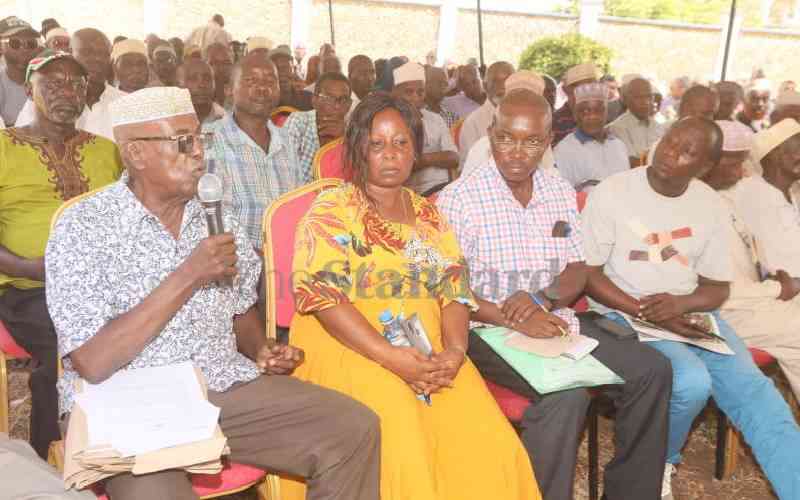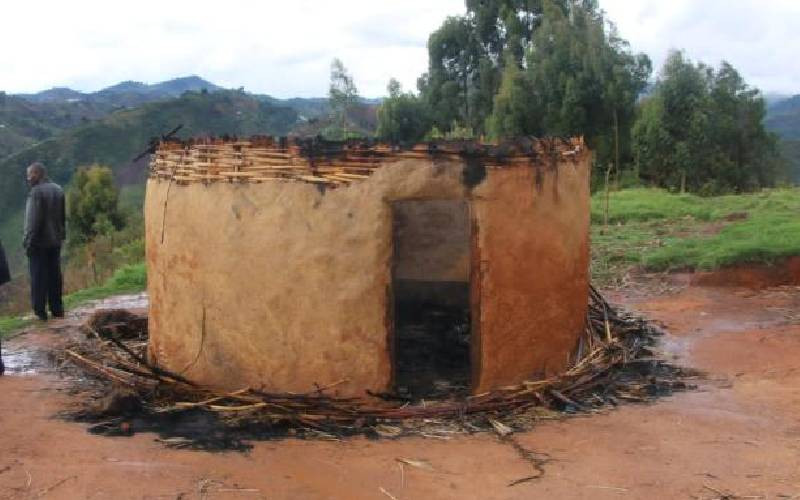 |
|
Lands Cabinet Secretary Charity Ngilu |
Kenyans are sharply divided on the significance of Jubilee Government’s handling of land issues, a new survey conducted by Ipsos shows.
The survey done by Ipsos Synovate and commissioned by Standard Group shows that Kenyans are split down the middle in levels of satisfaction with the Government’s handling of land issues.
Historically, land issues form the bulk of grievances among different Kenyan groups and communities. Many people have been killed, others maimed or displaced over land conflicts.
In the last few months, the National Lands Commission has faced off with the lands Cabinet minister over issuance of titles and resolution of land disputes. Earlier this month, the two agreed to a ceasefire following a directive by the Supreme Court.
Asked if they were satisfied with the way the Jubilee Government was handling land issues, 51 per cent of 2005 respondents interviewed said yes. Another 49 per cent said they were not satisfied.
“The satisfaction levels across the regions assumed an all familiar political pattern where Central led in terms of satisfaction at 78 per cent followed by Rift Valley at 59 per cent,” Ipsos’s project manager on opinion polls Victor Rateng told The Standard on Sunday.
In the poll, dissatisfaction on Jubilee’s handling of land issues is most high in North Eastern and Western both at 70 per cent and Nyanza 69 per cent. In Eastern region, 56 per cent of respondents are satisfied as opposed to 44 per cent who are not.
In Coast, the hotbed of land conflict in the last one year, 54 per cent expressed dissatisfaction with the Government’s handling of land problems against 46 per cent who are satisfied. The least dissatisfied region is Central at 22 per cent.
Predictably, when the respondents were divided between Jubilee and CORD, majority of Jubilee supporters said they were satisfied (69 per cent) and majority of CORD (72 per cent) said they were dissatisfied.
“One could say that political lenses of Kenyans tend to blur their assessment of issues of mutual concern to both sides of the divide. But then again, political divide in the country is shaped by among other things grievances on issues such as land,” Mr Rateng said.
In the same poll, it emerged that the recently shelved proposal to have Cabinet ministers appear in Parliament’s plenary for grilling is quite popular among Kenyans.
Asked whether they thought the ministers should go to the full house sittings, 61 per cent of respondents responded in the affirmative. Only 39 per cent opposed the appearances of the ministers. The issue attracted support from both sides of the political divide.
“Within Jubilee supporters a majority of 56 per cent against a minority of 44 per cent support the appearances. In CORD, support is a bit higher at 64 per cent against 36 per cent who oppose the idea. By and large, one can say the issue attracts a bipartisan support,” Rateng explained.
In a clear demonstration of this bipartisan support, the poll shows, respondents in all eight regions — Nairobi, Eastern, Central, Western, Nyanza, North Eastern, Coast and Rift Valley supported the initiative. Nairobi, Western, Eastern and Nyanza recorded the highest levels of support.
The least support in order of regions is Rift Valley followed by Central Kenya where Deputy President William Ruto and President Uhuru Kenyatta come from. The two are said to have opposed the idea, forcing National Assembly Speaker Justine Muturi to devise an exit route.
Stay informed. Subscribe to our newsletter
 The Standard Group Plc is a
multi-media organization with investments in media platforms spanning newspaper
print operations, television, radio broadcasting, digital and online services. The
Standard Group is recognized as a leading multi-media house in Kenya with a key
influence in matters of national and international interest.
The Standard Group Plc is a
multi-media organization with investments in media platforms spanning newspaper
print operations, television, radio broadcasting, digital and online services. The
Standard Group is recognized as a leading multi-media house in Kenya with a key
influence in matters of national and international interest.
 The Standard Group Plc is a
multi-media organization with investments in media platforms spanning newspaper
print operations, television, radio broadcasting, digital and online services. The
Standard Group is recognized as a leading multi-media house in Kenya with a key
influence in matters of national and international interest.
The Standard Group Plc is a
multi-media organization with investments in media platforms spanning newspaper
print operations, television, radio broadcasting, digital and online services. The
Standard Group is recognized as a leading multi-media house in Kenya with a key
influence in matters of national and international interest.










